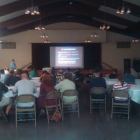
Sep 22, 2014
A few months ago, I was approached by some friends at a local fire department who were looking for some help developing and rolling out a pit crew CPR system for their people. I was quick to offer my help after watching the success that Louisville EMS has had over the last year and a half since rolling out their new CPR program. I felt like I had a good knowledge base and a number of resources, especially after the events of EMS World in New Orleans back in 2012.
The EMS officers from the fire department put in a tremendous amount of work developing a new procedure that utilized the department’s strength in numbers, and played off their established fireground culture where every piece of apparatus arriving at the scene of a fire has an assigned role.
After the procedure was developed, the rest of the project was dropped in my lap. They asked me to develop a class that talked about the importance of high performance CPR, the pit crew mentality, and stressed the values that our state had adopted by adding pit crew CPR to the upcoming BLS protocol updates. I took a couple of months, and developed what I felt was a strong presentation complete with evidence, videos, and plenty of theory.
Last week, that fire department opened their doors to anyone who was willing to listen. They put together a free class complete with a free dinner which, as Greg Friese will tell you, is a great way to get people in the door. Much to my surprise, ninety people attended the class from a number of different departments. The feedback from some of the attendees has been great, and I have even been approached by three more departments who want to develop their own SOP, and push CPR in their organization.
The entire project was a lot of fun for me. I have found a love for teaching, and being able to talk about something like running a better cardiac arrest is something that I have become very passionate about. I could not have done the job that I did without the connections that I have made through the years. Specifically, the lessons that I have learned from Ben Neal, Tom Bouthillet, and David Hiltz have been very influential.
As we continue ourselves moving forward here within my system, the hope is that we see our ROSC rate go even higher than it already is. My service has made a strong commitment to improving our cardiac arrest survival rate from the top right on down to the most junior street medic. It is great to see our BLS counterparts following suit.
